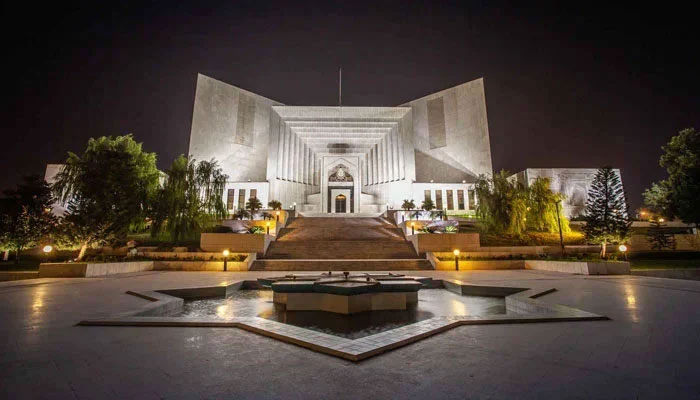AI mustn’t undermine judicial decision-making: SC
Court holds that AI must be welcomed with careful optimism adding that it can streamline judicial functions
ISLAMABAD: The Supreme Court has recommended developing comprehensive guidelines on the use of Artificial Intelligence (AI) in the country’s judicial system but cautioned that it must never become a substitute for judicial decision.
A two-member bench of the apex court — comprising Justice Syed Mansoor Ali Shah and Justice Aqeel Ahmed Abbasi — set aside a judgment of Lahore High Court on a rent dispute case and directed the respondent to vacate the property within two months.
“It must be unequivocally affirmed that AI is not, and must never become, a substitute for judicial decision-making,” says an 18-page judgment, authored by Justice Syed Mansoor Ali Shah.
The court held that adjudication was a constitutional function rooted in legal reasoning, institutional independence, and human empathy no automated system could replicate.
“Fairness and anti-discrimination principles must be hardwired into AI systems to prevent the replication of historical biases, guaranteeing equal treatment under the law,” Justice Shah held.
The court declared that the rule of law must always prevail over the rule of data, with human judges retaining ultimate authority to interpret evolving legal and moral standards.
The court held that AI must be welcomed with careful optimism adding that it can streamline judicial functions, reduce delays and expand access to legal knowledge.
“But it cannot replicate the moral, ethical, and empathic reasoning that lies at the heart of judging”, says the judgment adding that courts must thus pursue a calibrated integration harnessing AI’s efficiencies without surrendering the conscience, independence, and humanity that justice demands.
“We strongly recommend that the National Judicial (Policy Making) Committee in collaboration with the Law and Justice Commission of Pakistan considers developing comprehensive guidelines on the permissible uses of AI within the judiciary”, the judgment reads.
The court, however, stressed that these must delineate clear boundaries, ensuring that AI is used only as a facilitative tool and never in a manner that compromises human judicial autonomy, constitutional fidelity, or public trust in the justice system.
“Let a copy of this judgment be dispatched to both the Law and Justice Commission of Pakistan and the National Judicial (Policy Making) Committee for preparing guidelines to regulate this emerging intersection of law and AI,” the court ruled.
The court noted that the present case was a testament to this concern: the eviction petition was instituted before the learned Special Judge (Rent) in 2018, dismissed in 2021, and has only now come up for hearing before this Court in 2025.
The court further noted that petitioner-landlord had remained embroiled in litigation for over seven years merely to recover possession of his property, a course of delay that runs counter to the foundational objectives of rent legislation and summary adjudication.
The court held that such undue delays not only erode the constitutional rights of property owners but also give rise to broader economic and social justice concerns.
“In Pakistan’s overburdened courts, the integration of Artificial Intelligence (“AI”) presents a promising path to operational reform, provided its adoption remains grounded in principled constitutional limits,” says the judgment.
After converting the petition into appeal, the court directed the respondent to vacate the property in question within two months from the date of this judgment.
-
 Leonardo DiCaprio's Co-star Reflects On His Viral Moment At Golden Globes
Leonardo DiCaprio's Co-star Reflects On His Viral Moment At Golden Globes -
 SpaceX Pivots From Mars Plans To Prioritize 2027 Moon Landing
SpaceX Pivots From Mars Plans To Prioritize 2027 Moon Landing -
 J. Cole Brings Back Old-school CD Sales For 'The Fall-Off' Release
J. Cole Brings Back Old-school CD Sales For 'The Fall-Off' Release -
 King Charles Still Cares About Meghan Markle
King Charles Still Cares About Meghan Markle -
 GTA 6 Built By Hand, Street By Street, Rockstar Confirms Ahead Of Launch
GTA 6 Built By Hand, Street By Street, Rockstar Confirms Ahead Of Launch -
 Funeral Home Owner Sentenced To 40 Years For Selling Corpses, Faking Ashes
Funeral Home Owner Sentenced To 40 Years For Selling Corpses, Faking Ashes -
 Why Is Thor Portrayed Differently In Marvel Movies?
Why Is Thor Portrayed Differently In Marvel Movies? -
 Dutch Seismologist Hints At 'surprise’ Quake In Coming Days
Dutch Seismologist Hints At 'surprise’ Quake In Coming Days -
 Australia’s Liberal-National Coalition Reunites After Brief Split Over Hate Laws
Australia’s Liberal-National Coalition Reunites After Brief Split Over Hate Laws -
 DC Director Gives Hopeful Message As Questions Raised Over 'Blue Beetle's Future
DC Director Gives Hopeful Message As Questions Raised Over 'Blue Beetle's Future -
 King Charles New Plans For Andrew In Norfolk Exposed
King Charles New Plans For Andrew In Norfolk Exposed -
 What You Need To Know About Ischemic Stroke
What You Need To Know About Ischemic Stroke -
 Shocking Reason Behind Type 2 Diabetes Revealed By Scientists
Shocking Reason Behind Type 2 Diabetes Revealed By Scientists -
 SpaceX Cleared For NASA Crew-12 Launch After Falcon 9 Review
SpaceX Cleared For NASA Crew-12 Launch After Falcon 9 Review -
 Meghan Markle Gives Old Hollywood Vibes In New Photos At Glitzy Event
Meghan Markle Gives Old Hollywood Vibes In New Photos At Glitzy Event -
 Simple 'finger Test' Unveils Lung Cancer Diagnosis
Simple 'finger Test' Unveils Lung Cancer Diagnosis




